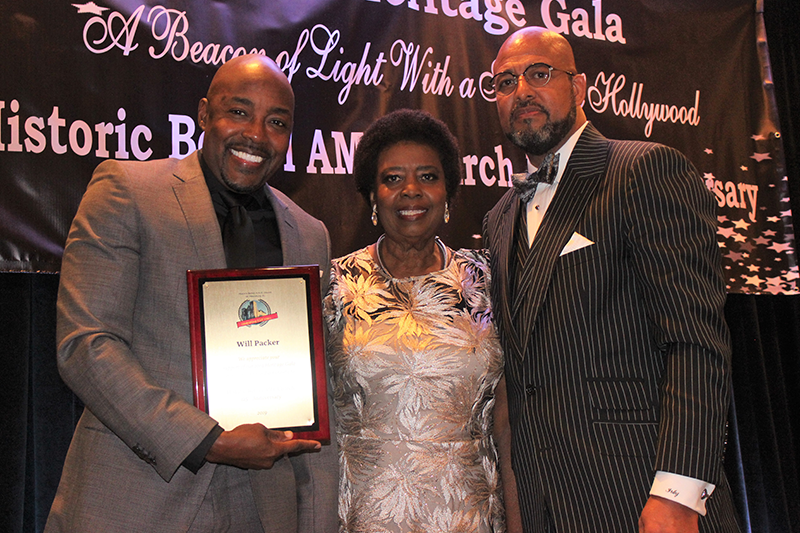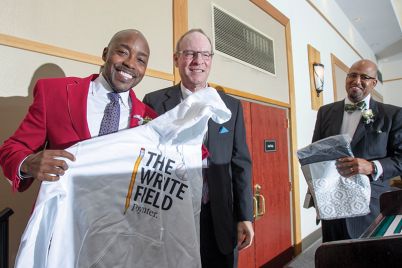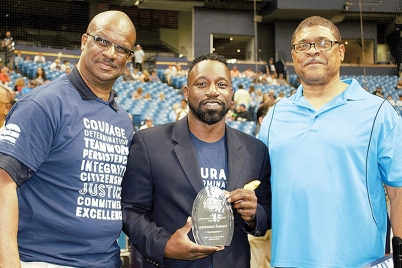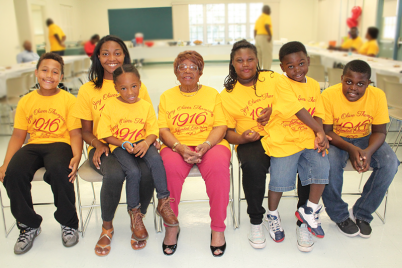Historic Bethel AME Church rolled out the red carpet for celebrities and honored guests who attended their 125th anniversary Saturday, Sept. 28, at the Hilton St. Petersburg Carillon Park Hotel.
BY FRANK DROUZAS, Staff Writer
ST. PETERSBURG — When Historic Bethel AME Church called, Hollywood responded! The oldest church in the City of St. Petersburg celebrated its 125th anniversary with the likes of Thomas “Nephew Tommy” Miles and native son and Hollywood producer Will Packer Saturday, Sept. 28.
Bethel AME has played an essential role in the spiritual, social, civic and educational history of St. Pete’s African-American community, especially that of the neighborhood known as “Methodist Town.”
In 1894, the original building was a wooden structure located on the same property. By 1905, that congregation outgrew the original building and the masonry church building known as the “stone church” was constructed in two phases.
In 1922, construction began on the present brick edifice architecturally based on the Gothic Revival style. It is modeled after Mother Bethel, the denominational connection landmark church in Philadelphia.
The new church was literally built over the existing masonry, and according to historical records, only one Sunday service was suspended due to construction.
Modern updates were added in 1965, such as central air and heat along with an addition for a pastor’s study, finance room and additional restrooms. An elevator was added in 1986, and later a major roof project was completed.
Much service and impact have been witnessed since Rev. J.S. Braswell and those faithful African-American settlers that moved to this fair city. At the 74th session of the West Coast Annual Conference before the 120th anniversary, Rev. Kenneth F. Irby was assigned to lead historic Bethel.
In June of 2016, the trustees contracted with All Trades Historical Restoration Company for the West Wall Project to restore the entire exterior, which included the roof, stain-glass windows and masonry work.
The project was funded by the State of Florida Historical Society grant made possible by then-State Representative Darryl Rouson.
Before Packer – who is known for producing 10 number one box office films — took to the podium, he was introduced by the chair of the anniversary committee, who just happened to be his mother, J. Birice Packer. She proceeded to list all of his failed aspirations from elementary school up until recently.
“I thought I had done something with my life until my mama came up here,” said Packer. “You don’t want your mama to introduce you. Boy, there was a lot of stuff y’all didn’t need to hear!”
From humble beginnings
“I have always — always! — been told that I can do anything I wanted to do,” Packer said, adding that he continuously has the full support of his parents to pursue his dreams.
He attended Florida A&M University where he graduated magna cum laude with a Bachelor of Science degree in Electrical Engineering. It was during these college years that the creative “bug” bit him.
While at FAMU, he made a film titled “Chocolate City” with limited means.
“I shot this movie, and I didn’t really have a budget; didn’t really know what I was doing,” he related. “But I was always audacious, right? I was always very confident in my ability.”
With the project completed, Packer wanted to have a world premiere for his film, which mostly featured his roommates, fraternity brothers and friends. Despite the obvious lack of star power in “Chocolate City,” Packer decided to mail invitations to “all the top people in Hollywood” for the film’s premiere.
“Sony, Universal, Paramount,” he said. “If you were a big dog, you got an invitation from me!”
The Emmy Award-nominated producer quipped that in the South if you sent out invitations to an event, you were owed at least the dignity of a reply. Needless to say, none of the Hollywood heavyweights deigned to Packer’s invite to attend his world-premiere about 3,000 miles away.
Even though no one replied, an optimistic Packer still reserved the entire front row of the theater for the movie studio folks, just in case.
His mother asked Packer if he had thought to invite Oprah Winfrey, and when he told her he hadn’t, she pressed him to invite her. More to appease his mother than anything else, Packer conceded and invited Winfrey as well.
The premier was a formal affair, Parker noted, so he insisted all the students rent tuxedoes and ball gowns for the film viewing. As it turned out, it drew a crowd so huge that not everyone could get into the premier, and he was duly chastised by some who were aware that the front row remained empty.
“Did you really invite Oprah Winfrey?” an incredulous student asked him. “With a plus one!”
Winfrey and all the invited Hollywood guests were all no-shows, and the front row stayed empty, Packer said.
“But guess what? Every other seat in that auditorium was packed,” he said. “Every other seat had somebody in it that wanted to see our little movie. That’s when I learned, I don’t make movies for just the people in the front row. I make my movies for everybody.”
With no Hollywood connections, Packer found it hard to get anyone interested in his film about life at an HBCU.
“Nobody in Hollywood wanted to make my movie,” Packer said. “You should have seen just how hard they told me, ‘No.'”
Not to be put off, Packer honed his pitch and tried again, even revisiting some of the same executives who had listened politely then showed him the door.
“I went back in the room with new energy, and I pitched it again!” he said. “And you know what they told me?” ‘Didn’t you come in here last week with that pitch! Didn’t we tell you “No” the first time!’ But with all those Nos, guess what? I got one Yes. That’s all it took.”
Packer took that one Yes and turned it into a movie called “Stomp the Yard,” which was the number one movie at the box office for two weeks in a row, he said.
With all that effort and energy expended, Packer conceded that he had been looking for validation, for someone to tell him he has “what it takes.”
“But really, the only validation that you need is already in you.” he said.
Packer, who served as executive producer of a remake of the popular TV series “Roots,” spoke of the multi-generational journey that so many Africans made to this continent, and pointed out that the current generations are descended from stout survivors of the horrific conditions of enslavement.
“It’s already in you,” he told his audience. “You have the power…I want us to realize our own power and not give it away.”
Historic Bethel AME honors the community
Larry Walker acknowledged six pastors who are still alive that tended to the Bethel AME flock in years past: Rev. Josephus Johnson, Rev. Roosevelt Hardy, Rev. Jimmy B. Keel, Rev. Donald Connelly, Rev. Ronald Williams and Rev. Bryant Fayson.
Mildred Reed-Reliford introduced five organizations and individuals representing them for outstanding service to St. Pete and its extended community. These organizations have displayed exemplary service and dedication to improve and enhance the city.
- Leon Jackson – The Courageous 12
- Thelma Bruce – National Council of Negro Women
- Maria L. Scruggs – NAACP
- Ladonna Butler – The Well for Life
- Lyn Johnson – The Weekly Challenger newspaper









